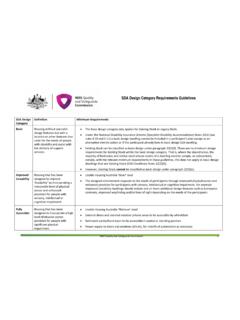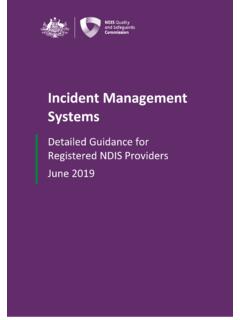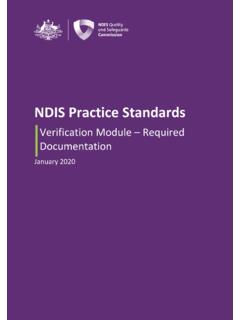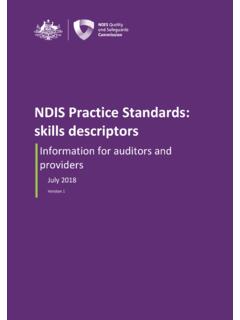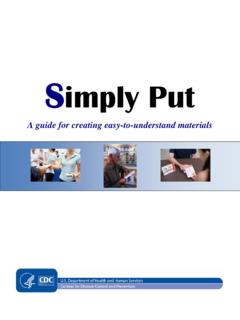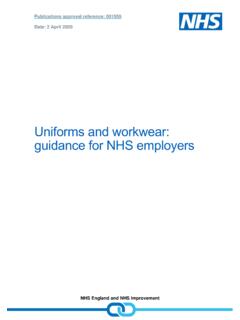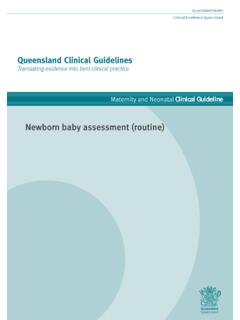Transcription of NDIS Practice Standards: skills descriptors
1 NDIS Practice Standards: skills descriptors Information for auditors and providers November 2021 Version 2 NDIS Quality and Safeguards Commission 1 Contents What are skills descriptors ? .. 2 Which supports do the skills descriptors apply to? .. 2 Who developed the skills descriptors ? .. 2 High intensity support skills descriptors .. 2 Complex Bowel Care .. 2 Enteral Feeding and Management .. 4 Severe dysphagia management .. 6 Tracheostomy care .. 7 Urinary catheters .. 8 Ventilation .. 9 Subcutaneous injection .. 10 Manage diabetes .. 11 Additional support activities general advice to providers .. 12 High risk of seizure .. 12 Pressure care and wound management .. 14 Mealtime preparation and delivery .. 15 Stoma 16 NDIS Quality and Safeguards Commission What are skills descriptors ? The high intensity support skills descriptors (the skills descriptors ) set out the skills and knowledge that NDIS providers should have access to when delivering complex supports, safely, to NDIS participants.
2 These complex supports represent some of highest risks for participants, workers and others, and are areas where NDIS providers must take particular care to source the relevant skills and knowledge to deliver high quality and safe supports. Auditors and NDIS providers will use this document to determine whether the skills and capabilities used in the delivery of the related NDIS supports and services provide a safe environment for NDIS Participants. Which supports do the skills descriptors apply to? The National Disability Insurance Scheme (Quality Indicators) Guidelines 2018 detail the indicators that providers are required to meet to comply with the NDIS Practice Standards. Some of these indicators set minimum competency requirements for supports workers. The module of the Quality Indicators that the skills descriptors apply to is: Module 1: High Intensity Daily personal Activities The skills descriptors for Module 1 are outlined in Annexure A.
3 There are also some skills that apply to other support activities. These skills descriptors are also set out in Annexure A. They may form a co-requisite with the high intensity support descriptors above, depending on the person s support needs. Who developed the skills descriptors ? The skills descriptors were developed by the Department of Social Services in consultation with experts from the disability and health sectors to cover the breadth of high intensity support activities. Advisory panels on specific health-related support activities were convened. The NDIS Commission will review and refine these skill descriptors over time. NDIS Quality and Safeguards Commission 2 High intensity support skills descriptors Complex Bowel Care High intensity support activity Complex Bowel Care Description Bowel care is a routine part of personal support. It requires a specialist level of support where the participant is at risk of severe constipation or faecal incontinence, for example, CP GMFCS1 levels 3,4,5; spinal injuries; some ABI and where the bowel care plan involves non-routine treatment such as use of non-routine PRNs.
4 Context: A bowel care plan has been developed and is overseen by a health practitioner. Minimum plan requirements include information on normal stool appearance for the individual; how to identify symptoms that require action, timing of intervention (how long before action is taken) and the action required. Providers will support their workers and others involved in providing supports to: Follow personal hygiene and infection control procedures; recognise the intensely personal nature of this type of support and make sure of the participant s consent for the approach; observe and record change bowel habits; administer laxatives, enemas or suppositories according to procedure and identify when to seek health practitioner advice. High intensity support work includes administration of non-routine medication as required. Providers will deploy staff with knowledge of: basic anatomy of the digestive system, importance of regular bowel care and understanding of stool characteristics indicating healthy bowel functioning and related signs and symptoms, basic understanding of related conditions including autonomic dysreflexia; symptoms/indications of need for intervention and when to refer to health practitioner overflow, impaction, perforation; infection, understanding of intervention options and techniques including 1 Cerebral Palsy (CP) Gross Motor Function Classification System (GMFCS) NDIS Quality and Safeguards Commission High intensity support activity Complex Bowel Care Description administering enemas and suppositories, digital stimulation, massage etc.
5 And related guidelines and procedures, nutrition and hydration requirements. NDIS Quality and Safeguards Commission Enteral Feeding and Management High intensity support activity Enteral Feeding and Management Description Supporting a person who is reliant on Percutaneous endoscopic gastrostomy (PEG) feeding can be part of a general support worker role. A person reliant on NG feeding typically has more complex health issues requiring high intensity support. The need for high intensity support is also indicated when other factors are present. For example, where behaviour means a person frequently dislodges the feed tube; the person is at high risk of choking and aspiration - this can include people with severe epilepsy, severe dysphagia, complex physical disability; people who are unable to feed themselves; people with complex communication. The length of time allocated to mealtime assistance can provide an Context: A mealtime preparation and delivery plan has been developed and is overseen by a health practitioner (may include more than one health practitioner dietician, speech therapist, occupational therapist).
6 Providers will support their workers and others involved in providing supports to: Follow personal hygiene and infection control procedures; confirm need and consent for enteral feeding, introduce food via tube according to plan; monitor rate and flow of feeding and take appropriate action to adjust if required; keep stoma area clean and monitor and report signs of infection; check that the tube is correctly positioned, monitor equipment operation; follow procedures to respond to malfunction blockages, follow procedures to document a request to review mealtime plan where required; liaise with health practitioners to explain/demonstrate requirements ( hospital staff), recognise and respond to symptoms that could require health intervention reflux, unexpected weight gain or loss, dehydration, allergic reaction, poor chest health. Replacement of Nasogastric (NG) tubes is high risk and should be done by a health practitioner.
7 In some cases, support workers may respond when PEG tubes become dislodged. This is only appropriate when the balloon device tube is in position and stable (after the initial tube has been replaced by balloon device), and there is active oversight by a health practitioner. Providers will ensure that all workers deployed to support enteral feeding has knowledge of: basic anatomy of the digestive system; equipment components, function, cleaning and maintenance procedures; stoma care requirements and procedures; awareness of risks associated with departing from plan and ability to explain these risks to others including carers. NDIS Quality and Safeguards Commission High intensity support activity Enteral Feeding and Management Description indication of the intensity of support required. This activity overlaps with mealtime assistance. Providers will ensure that all workers deployed to provide high intensity support has knowledge of: the impact of associated health conditions and complications that interact with enteral feeding related cardiac or respiratory disorders; very complex physical disability; severe epilepsy; symptoms that indicate the need for intervention poor chest health, dehydration, reflux; factors that may require immediate adjustment rate, flow and quantity of food.
8 When working with people who have very complex physical disability, workers also need training in positioning and turning to maintain airway safety and avoid choking risk and in pressure care. NDIS Quality and Safeguards Commission Severe dysphagia management High intensity support activity Severe Dysphagia Management Description Workers may support people who need assistance to manage severe dysphagia. This is a high intensity support activity that requires specialist skills and training by a speech pathologist. The worker needs to know about severe dysphagia and how to implement a person s mealtime management plan. They must be able to identify changes and difficulties in swallowing, to respond to coughing and choking, to follow referral pathways, and to apply emergency First Aid. This activity overlaps with mealtime assistance, oral care, and enteral tube feeding and management. Context: Providers recognise complexity in the management of individuals with severe dysphagia, obtain input from a speech pathologist and other appropriate health practitioners, and ensure support workers are prepared for and able to provide support for the person s safe and enjoyable meals.
9 Providers will support their workers and others involved in providing supports to: Identify participants who need management for severe dysphagia; refer participants with severe dysphagia for assessment by a speech pathologist and other appropriately qualified health practitioners; identify and act when a person s eating and drinking needs change or swallowing/mealtime difficulties are observed; undertake training with a speech pathologist in relation to managing severe dysphagia; read, interpret, understand and implement an individual s prescribed mealtime management plan; support and implement the person s recommended regular oral hygiene practices; prepare and provide food and fluid of the correct texture as recommended in the mealtime plan; communicate with the person about their mealtimes and food/fluid preferences; follow recommended procedures for food and fluid preparation techniques, mealtime positioning, and the use of mealtime equipment; support the person s independence, participation in, and enjoyment of the meal; monitor the person during and after eating, drinking, or having a tube feed; and identify and immediately respond to risks, incidents and emergencies related to eating or drinking.
10 Providers will deploy staff who: know about and implement policies, procedures, and action plans related to supporting a person with severe dysphagia; recognise and respond to the signs, symptoms and risks associated with severe dysphagia; and know and avoid the hazards, risks and adverse events associated with not following the person s mealtime management plan. NDIS Quality and Safeguards Commission Tracheostomy care High intensity support activity Tracheostomy care Description When providing support to a person who is also reliant on ventilation, the worker also needs to be competent in the support descriptor: support a person dependent on ventilation. Replacing tracheostomy dressing/ties requires 2 workers to be present due to risk of accidental decannulation. Workers providing this support also need basic first aid skills and knowledge required to administer CPR and place a person in a recovery position.
